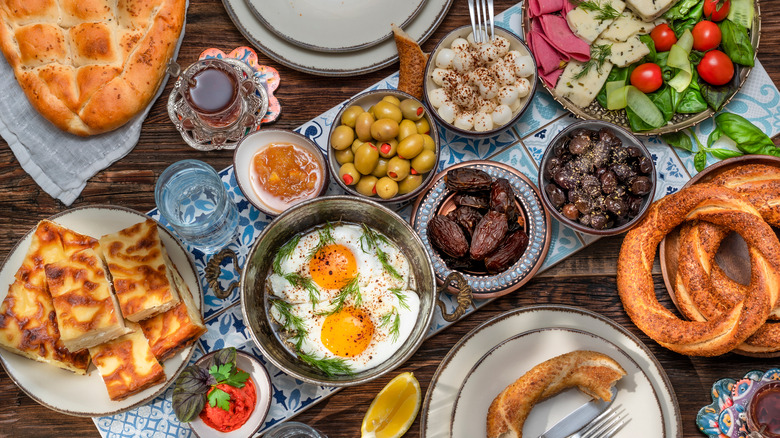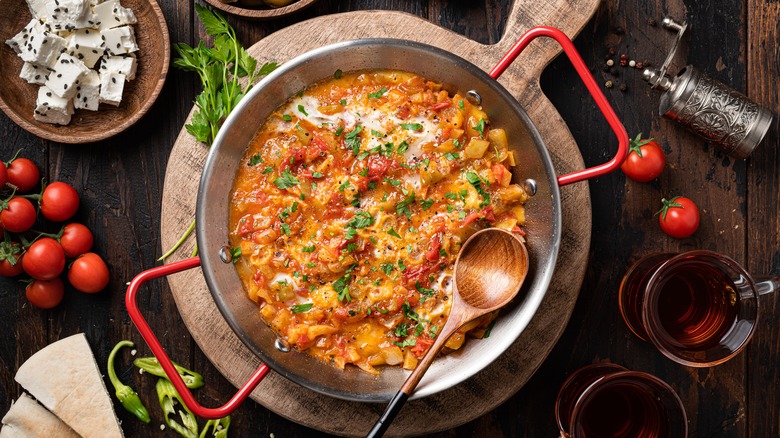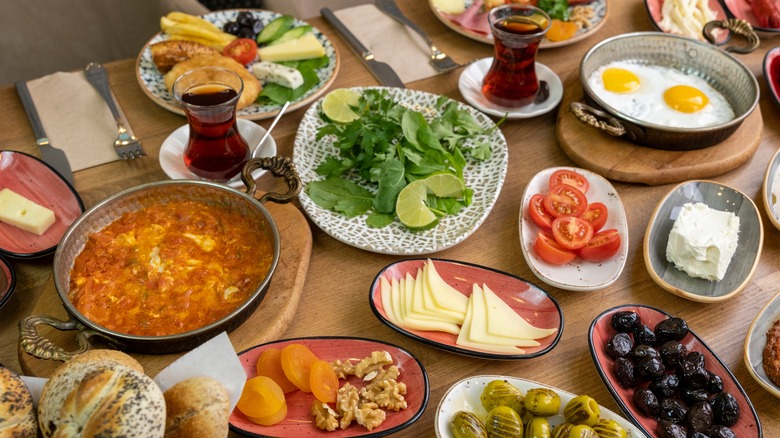What A Traditional Breakfast Looks Like In Turkey
Influenced by the country's history through the centuries, the neighbors that surround its borders, and the mountains and rivers that make up its fertile land, Turkish cuisine is as rich, hearty, and delicious as it is diverse, and no meal encapsulates this better than the very first meal of the day. Known as kahvaltı after the Turkish words kahve (coffee) and altı (before) — meaning the meal that comes before coffee — breakfast in Turkey is more of a social, sit-down affair rather than a grab-and-go bite for quick nourishment.
A Turkish breakfast typically features dozens of dishes: A preparation of eggs always graces the table, fresh fruits and vegetables such as olives, cucumbers, tomatoes, and peppers are laid out, and bread along with sweet and savory spreads, dips, and cheese are important parts of the meal. While the lavish spread may be downsized to a lighter and quicker-to-eat meal on weekdays, a traditional Turkish breakfast is best feasted on at a leisurely pace with friends and family over several hours.
Eggs and bread are the stars of the show
The central element of a typical Turkish breakfast is eggs — much like American breakfasts that feature several egg preparations. A particular favorite is menemen, which is a one-pan dish of scrambled eggs cooked in a tangy tomato sauce with herbs, spices, bell peppers, and onions. Eggs are also poached and served on creamy garlic-flavored yogurt sauce with red pepper-spiced butter in çılbır or Turkish eggs, or simply cooked with spinach in ispanakli yumurta.
Eggs and meat are a popular pairing too. For example, fried eggs are served along with sucuk (spicy beef sausage seasoned with the likes of cumin and garlic) in a dish known as sucuklu yumurta, or on a bed of roasted ground meat with onions and bell peppers in kıymalı yumurta. Turkish breakfasts may also feature kızarmış yumurta — halved boiled eggs fried in butter and served with a sprinkle of red pepper flakes and thyme.
Besides eggs, another element that diners will always find on a breakfast spread in Turkey is bread — albeit in different forms. There are Turkish flatbreads called pide topped with ground meat and eggs or vegetables and cheese, and crisp gozleme toasted on griddles with fillings of spinach and cheese. There are pillowy soft bazlamas, börek pastries with layers of savory cheese sandwiched between flaky phyllo sheets, and even sesame seed-crusted twisted bagels known as simit that are topped with eggs, meats, vegetables, and cheese.
A Turkish breakfast is incomplete without spreads, cheese, and tea
There are plenty of other elements that go onto the table besides eggs and bread to make a lavish feast. The first meal of the day begins with an abundance of cheese — whether that's the staple feta-like beyaz peynir, kasar cheese that's meant for grating and melting, the soft lor that's akin to cottage cheese and served with olive oil and spices, or the semi-hard Van herbed cheese (Van otlu peyniri) famous in the Van province of eastern Turkey. Kuymak or mihlama is another fondue-like pot of melty cheese that's made with butter and cornmeal and served with cubes of bread.
Flanking the many varieties of cheese will be platters of fresh fruits, vegetables, nuts, and dried fruits as well as an array of sweet and savory spreads. Savory spreads are made from tomatoes and black olives — and sweet ones are made from grape molasses whisked with tahini. A much-loved spread is kaymak — a thick condiment similar to clotted cream that is smeared onto bread and drizzled with honey.
As for the beverages that accompany it, Turkish kahvalti precedes coffee, indicating that the famously thick and unfiltered Turkish coffee doesn't make an appearance until after breakfast is over. Instead, Turkish tea or çay is the preferred drink for breakfast. Brewed in two-layered pots known as çaydanlık, Turkish tea is best drunk black with a cube of sugar to sweeten it.



